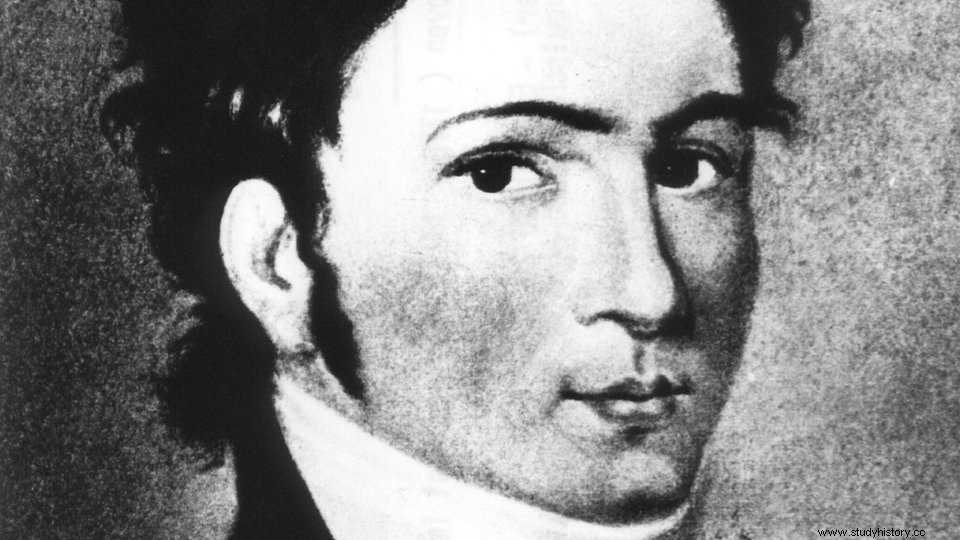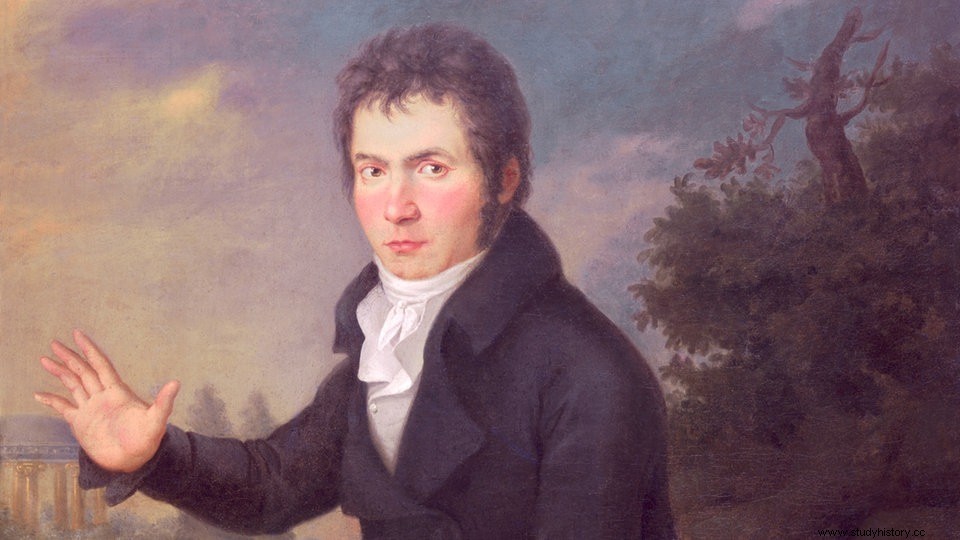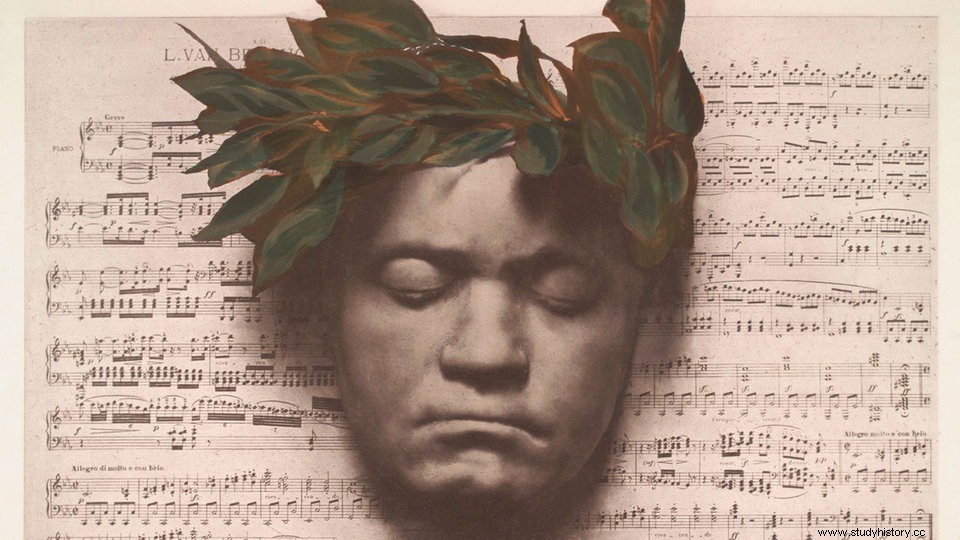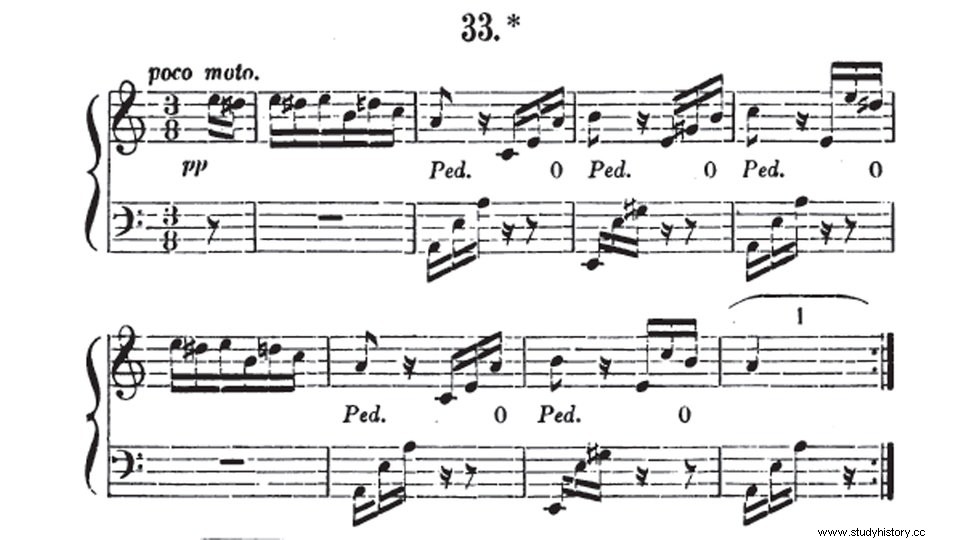He is one of the world's most famous Germans and one of the greatest composers of all time. His music has proven to be timeless. But the life of Ludwig van Beethoven is only sparsely documented.
Youth in Bonn
Letters and correspondence from Beethoven also exist, but the whole thing is incomplete. And so authors who have tried to work on his biography come to quite different conclusions and interpretations.
Ludwig van Beethoven's exact date of birth is unknown. Only the date of his baptism, December 17, 1770, has survived. Beethoven was born into a family of musicians on his father's side. Even the grandfather, whose name was also Ludwig, was court music director in Bonn.
Beethoven's father Johann also worked as a musician, but his career suffered from his constant alcohol consumption. Nevertheless, he was the driving force behind his son's musical education.
The young Ludwig learned piano, organ and violin in early childhood. And similar to Mozart, Beethoven's father made sure that the talented son gave his first public concert at the age of seven.
At the age of twelve, the young Ludwig published his first compositions under the stage name "Louis van Beethoven". And he became a member of the Bonn court orchestra, where he quickly rose to second court organist.
At the age of 16, Beethoven traveled to Vienna to study, where he supposedly wanted to take lessons from Mozart, but this did not happen. Because of the death of his mother Maria Magdalena, he had to end this trip again at short notice.
He returned to Bonn and took over the role of head of the family for his two younger brothers and the alcoholic father. Despite this burden, Beethoven was able to continue to concentrate on his musical education. In 1789 he became a student at Bonn University.

Beethoven as a young man
Musician life in Vienna
In 1792 Beethoven left Bonn and moved to Vienna. He was to remain there until the end of his life. In Vienna, Beethoven and his music soon found their way into the higher aristocracy, who also supported him financially.
He also made a living from teaching and selling the sheet music of his works. However, their success in Vienna was quite variable:His only opera "Fidelio" was still receiving bad reviews in 1805, nine years later it was celebrated by the Viennese audience.
A major problem for Beethoven was his hearing loss, which began at the age of 27 and led to his complete deafness at the age of 48. Nevertheless, he continued to compose, even though he could no longer hear his late works, including the famous "Ninth Symphony".
Beethoven died on March 26, 1827 at the age of only 56 after a long illness of cirrhosis of the liver. His funeral in Vienna, which is said to have gathered around 20,000 people, showed just how popular he was back then.

Beethoven was controversial in Vienna
An unpredictable worker
If you deal with Beethoven's music, you will notice that it actually corresponds to the generic term under which it is classified in the German-speaking world:serious music or "serious music". While Mozart's music is very playful and often sounds very happy, Beethoven's work is usually very dramatic.
But that is precisely what is now regarded as Beethoven's great merit. He was one of the first composers to structure music dramaturgically. Many of his compositions culminated in a grand finale, while other composers' pieces simply ended at one point.
A certain unpredictability is also typical of his music. From the beginning of his pieces it is usually not possible to guess how they will continue. Beethoven always incorporated completely surprising twists and turns into his pieces.
He approached his music with almost scientific seriousness. While Mozart got to know many styles on his endless travels through Europe and absorbed them almost in passing, Beethoven kept taking lessons from other musicians.
One of his most important sponsors was Christian Gottlob Neefe. He taught Beethoven from the age of ten and also ensured the publication of his first works. Neefe also aroused Beethoven's interest in philosophy and politics, which later flowed into his music again and again.
Especially in his early work, Beethoven always wanted to depict and appeal to the heroic in people. Perhaps one reason why his music found more recognition among the Viennese nobility than the comparatively playful Mozart.

A mask cast from 1812
Music for Humanity
Beethoven's work is usually divided into three phases. The early phase, which is still strongly influenced by Joseph Haydn, ends around 1802. Then follows the "heroic" period of the symphonies and his only opera. And finally the so-called "late work", partly composed when he was already completely deaf.
In the 56 years of his life, Beethoven left around 340 works, including symphonies, piano concertos, string quartets and an opera. Compared to Mozart, who wrote more than 600 works in his 35 years - some even speak of more than 1000 - this sounds very little.
The reason for the smaller total work has to do with the completely different working methods of the two composers. Mozart worked very spontaneously. Once he had written a play, it was over for him.
Beethoven, however, worked on his works for a long time, correcting and improving them again and again, which is why he often did not finish commissioned compositions in time.
One reason for his perfectionism might be that Beethoven was one of the first musicians who assumed that his musical work would also be of importance for posterity. It therefore had to meet the highest quality standards. Most other composers of the time worked with the belief that their pieces would be forgotten within a few years.
-
 Putting Beethoven's music into motion with your smartphone | digital school
Putting Beethoven's music into motion with your smartphone | digital school
Beethoven's popularity fluctuated widely throughout his life. This may have been due to the fact that Beethoven occasionally overwhelmed his audience or that he was too far ahead of his time.
This is shown by his opera "Fidelio", which was only criticized when it was first performed in 1805, but nine years later suddenly met the taste of the audience.
Some of his compositions would prove to be particularly timeless. These include the piano piece "Für Elise" and the "5th Symphony", the intro of which became one of the most famous moments in serious music. And of course the "9th Symphony", which culminates in the well-known "Joy, beautiful gods' spark".

The most famous Elise in the world
Living in isolation
As a person, Beethoven remains contradictory and enigmatic. From childhood he is said to have been a loner. He probably enjoyed little schooling because his father pushed him to learn music instead.
In later years, Beethoven was very interested in philosophy, literature and politics. After his father became increasingly addicted to alcohol and his mother died, Ludwig also had to assume the role of head of the family. He thus learned early on to fulfill obligations and expectations.
An attitude that continued throughout his life. He later stated:"If I had wanted to give up my vitality with life, what would have been left for the noble, the better?"
Beethoven's relationship to women remains a mystery. He was never married. Supposedly he made some women proposals, but they turned them down. After his death, several love letters addressed to an unknown lady were found in his estate, which he apparently never sent.
To this day, Beethoven researchers are puzzled as to who this "immortal lover" could have been or whether she was even just a product of his imagination.
A story from the last years of his life, according to which he took over the guardianship of his nephew Karl after the death of his brother Kasper Karl, also seems somewhat bizarre. Although the mother was still alive, Beethoven really fought for the boy. But then he raised him so strictly that he attempted suicide to escape from his uncle's life.
In general, Beethoven was considered difficult and extremely moody. His household staff is said to have never stayed with him for long. He is also said to have changed apartments in Vienna at least 25 times, which speaks for a great deal of restlessness.
In his letters, on the other hand, Beethoven always seems very concerned and concerned about his fellow human beings. He even supported his students financially when they were in need. But Beethoven must have been aware that those around him didn't have it easy and he often felt misunderstood.
In a will that he wrote in 1802 during a spa stay in Heiligenstadt, he tried to justify his often rough manner with his increasing deafness.

Even his ear trumpet didn't help him in the end
